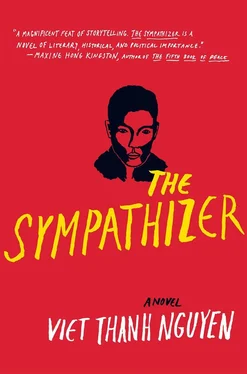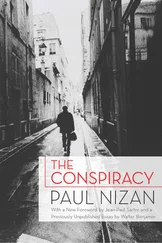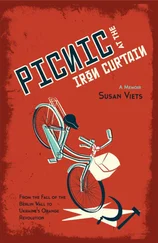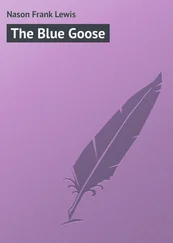With that one word, I completed my reeducation. All that remains to be told is how I glued myself back together, and how I found myself where I am now, preparing for a watery departure from my country. Like everything else of consequence in my life, neither task was easy. Leaving, in particular, is not something that I want to do but is something I must do. What in life is left for me, or any of the other graduates of reeducation? No place exists for us in this revolutionary society, even for those who think of ourselves as revolutionaries. We cannot be represented here, and this knowledge hurts more than anything done to me in my examination. Pain ends but knowledge does not, at least until the mind rots away — and when would that ever happen for me, the man with two minds?
The end of pain, at least, began when I spoke that one word. In retrospect the answer was obvious. So why did it take me so long to understand? Why did I have to be educated and reeducated for so many years, and at such great expense to both the American taxpayer and Vietnamese society, not to mention considerable damage to myself, in order to see, at last, the word that was there at the very beginning? The answer was so absurd that now, months later and in the temporary safety of the navigator’s house, I laugh even as I reread this scene of my enlightenment, which itself devolved — or is it evolved? — from screams to laughter. Of course I was still screaming when the commissar came to turn off the light and sound. I was still screaming when he unbound me and embraced me, cradling my head against his breast until my screams subsided. There, there, he said in the dark examination room, silent at last except for my sobbing. Now you know what I know, don’t you? Yes, I said, sobbing still. I get it. I get it!
What was it that I got? The joke. Nothing was the punch line, and if part of me was rather hurt at being punched — by nothing, no less! — the other part of me thought it was hilarious. That was why, as I shook and shuddered in that dark examination room, my wailing and sobbing turned to howls of laughter. I laughed so hard that eventually the baby-faced guard and the commandant came to investigate the cause of the commotion. What’s so funny? the commandant demanded. Nothing! I cried. I was, at last, broken. I had, at last, spoken. Don’t you get it? I cried. The answer is nothing! Nothing, nothing, nothing !
Only the commissar understood what I meant. The commandant, flustered by my bizarre behavior, said, Look what you’ve done to him. He’s out of his mind. He was not so much concerned with me as he was about the camp’s health, for a madman who kept on saying nothing would be bad for morale. I was mad that it had taken me so long to understand nothing, even though my failure, in hindsight, was inevitable. A good student cannot understand nothing; only the class clown, the misunderstood idiot, the devious fool, and the perpetual joker can do that. Still, such a realization could not spare me from the pain of overlooking the obvious, the pain that drove me to push the commissar away, to beat my fists against my forehead.
Stop that! said the commandant. He turned to the baby-faced guard. Stop him!
The baby-faced guard struggled with me as I beat not only my fists against my forehead, but my head against the wall. Finally, the commissar and the commandant themselves had to help him tie me down again. Only the commissar understood that I had to beat myself. I was so stupid! How could I forget that every truth meant at least two things, that slogans were empty suits draped on the corpse of an idea? The suits depended on how one wore them, and this suit was now worn out. I was mad but not insane, although I was not going to disabuse the commandant. He saw only one meaning in nothing — the negative, the absence, as in there’s nothing there . The positive meaning eluded him, the paradoxical fact that nothing is, indeed, something. Our commandant was a man who didn’t get the joke, and people who do not get the joke are dangerous people indeed. They are the ones who say nothing with great piousness, who ask everyone else to die for nothing, who revere nothing. Such a man could not tolerate someone who laughed at nothing. Satisfied? he asked the commissar, both of them looking down on me, sobbing, weeping, and laughing all at the same time. Now we have to call in the doctor again.
Call him in, then, said the commissar. The hard part’s done.
The doctor moved me back to my old isolation cell, although now the chamber was unlocked and I was not shackled. I was free to go as I pleased but was reluctant to do so, sometimes needing the baby-faced guard to coax me out of the corners. Even on those rare occasions when I emerged voluntarily, it was never into sunlight, but only the night, a conjunctivitis having rendered my eyes sensitive to the solarized world. The doctor prescribed an improved diet, sunlight, and exercise, but all I wanted was to sleep, and when I was not sleeping, I was somnambulent and silent, except for when the commandant came. Is he still not saying anything? the commandant asked whenever he dropped by, to which I said, Nothing, nothing, nothing, a grinning simpleton huddled in the corner. Poor fellow, said the doctor. He is a little, how shall we say, discombobulated after his experiences.
Well, do something about it! cried the commandant.
I’ll do my best, but it’s all in his mind, the doctor said, pointing at my bruised forehead. The doctor was only half right. It was certainly all in my mind, but which one? Eventually, however, the doctor did hit on the treatment that put me on the slow road to recovery, its end the reunification of me with myself. Perhaps, he said one day, sitting on a chair next to me as I huddled in the corner, arms folded and head resting on them, a familiar activity might help you. I peered at him with one eye. Before your examination began, your days were occupied by writing your confession. Your state of mind is such that I don’t think you can write anything now, but perhaps just going through the motions may help. I peered at him with both eyes. From his briefcase, he extracted a thick stack of paper. Does this look familiar? Cautiously, I unfolded my arms and took the stack. I looked at the first page, then the second, and the third, slowly thumbing my way through the numbered sheaf of 295 pages. What do you think that is? said the doctor. My confession, I muttered. Exactly, dear fellow! Very good! Now what I want you to do is to copy this confession. Out came another stack of paper from his briefcase, as well as a handful of pens. Word for word. Can you do that for me?
I nodded slowly. He left me alone with my two stacks of paper, and for a very long time — it must have been hours — I stared at the first blank page, pen in trembling hand. And then I began, my tongue between my lips. At first I could copy only a few words an hour, then a page an hour, and then a few pages an hour. My drool dotted the pages as I saw my entire life unfold over the months it took to copy the confession. Gradually, as my bruised forehead healed, and as I absorbed my own words, I developed a growing sympathy for the man in these pages, the intelligence operative of doubtful intelligence. Was he a fool or too smart for his own good? Had he chosen the right side or the wrong side of history? And were not these the questions we should all ask ourselves? Or was it only me and myself who should be so concerned?
By the time I finished copying my confession, enough of my senses had returned for me to understand that the answers were not to be found in those pages. When the doctor next came to examine me, I asked for a favor. What is it, dear fellow? More paper, Doctor. More paper! I explained that I wanted to write the story of those events that had happened after my confession, in the interminable time of my examination. So he brought me more paper, and I wrote new pages about what had been done to me in the examination room. I felt very sorry for the man with two minds, as would be expected. He had not realized that such a man best belonged in a low-budget movie, a Hollywood film or perhaps a Japanese one about a military-grade science experiment gone terribly awry. How dare a man with two minds think he could represent himself much less anyone else, including his own recalcitrant people? They would never, in the end, be representable at all, regardless of what their representatives claimed. But as the pages mounted, I felt something else that surprised me: sympathy for the man who did those things to me. Would he, my friend, not also be tortured by the things he had done to me? I was certain he would be by the time I finished writing, by the time I concluded with me screaming that one awful word into the bright, shining light. All that remained after the certainty was to ask the doctor to let me see the commissar once more.
Читать дальше












